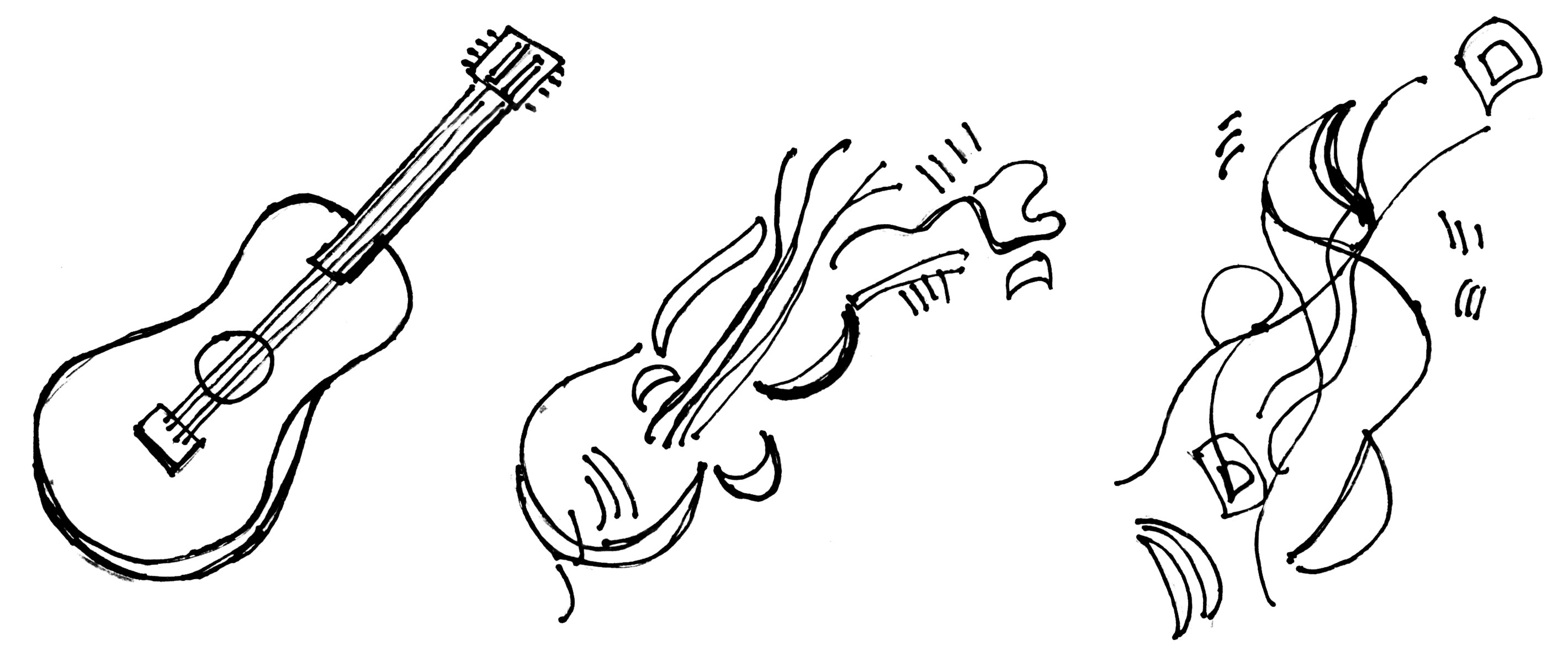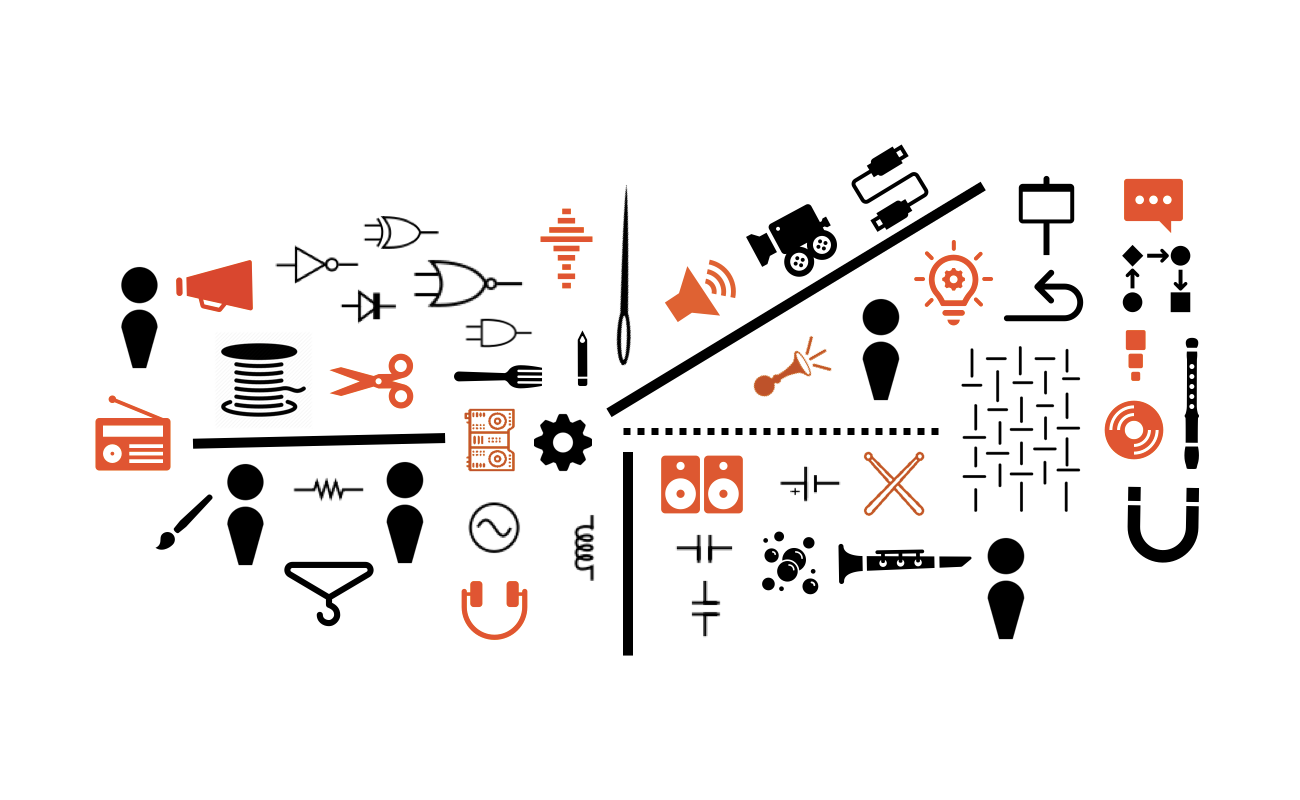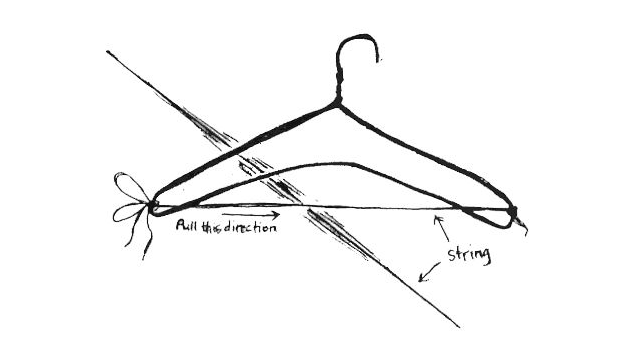Design Fiction and Absurd Making as NIME Practices
DATE AND TIME: 21 July - 2-4 pm (UK time)
SUBMISSION DEADLINE : EXPIRED

The 10.000 Instruments workshop aims to cheer up social distancing through some playful interactions. We invite the NIME community to dive in an online gathering to collaborativelly sketch as many instrument ideas as possible. A lighthearted activity that might ease for a couple of hours the challenging situations we are all experiencing.
An opportunity to experiment with alternative ways to generate interface ideas and speculate on music tech through open-ended artefacts and playful design explorations. An unconventional workshop to advance the debate around the complex, interdisciplinary and multifaceted nature of contemporary musical instruments.

Play Make Believe: Exploring Alternatives
This speculative virtual workshop attempts to engage with critical NIME discourse through creative and collaborative design explorations. The workshop draws on a small but growing body of work that challenges technology ideation and development through absurd, speculative and playful artefacts. These include the work of Kristina Andersen on the Magic Machine workshops and John Bowers and Owen Green which exploited the notion of hijacking as a way to question existing music technologies. Another example is of such approach is the Absurd Music Hackathon held at Queen Mary University in which the making of intentionally silly, absurd and provocative instruments allowed participants to generate a critique of current technology and illustrate future musical visions.
Critical Discourse & NIME Design
The workshop aims to generate critical discussions on new musical interfaces through playful devices such as absurdity, magic and make-believe. The activity will be an opportunity to create reflections that would be difficult to earn with more traditional methods, while avoiding overly theoretical and formal discussions. By moving away from classical design methods and looking at more subversive approaches we hope to question both our own practice and the routines we sometimes encounter in academic and research areas. The aim is to question the role of technology in creative practice through make-believe, fragile and contradictory artefacts and playful design explorations. By making and sharing imaginary musical instruments we aim to expand on how can absurdity and humour be helpful to stretch and critique conventional ideas of what is useful, appropriate and sensible in (music) technology research and development.

10.000 Instruments
Have a look to the workshop proposal.
The 10.000 Instrument workshop will feature a permissive and open-ended online workspace where participants can collaborate to sketch new interface ideas, including seriously silly concepts, not-yet-existing designs and variations of existing instruments. The instruments will be collected on a shared workspace (e.g. Google slides) and made available for collective explorations. Participants are then invited to share, come and go, further develop others’ ideas, follow intuitions and play with both humour and risky ideas (always in respectful and kind fashion).
Attendees are encouraged to use the tools and materials they prefer to sketch their ideas, as far as the results can be documented and shared online. These might include text descriptions, hyperlinks, recycled and found materials (see picture below), mock-ups and fictional artefacts, hand drawing, 2D and 3D rendering, collages, pictures, videos, painting, etc. Please make sure to gather the materials and tools you would like to use during the workshop before the start of the event.
The workshop outcome will be a shared online document, as a roughly organised collection of artefacts, concerns and conversations emerged during workshop. This collection (e.g. annotations, pictures and videos) will be afterwards made public by the organisers in a webzine-like format. This on-line pamphlet will then gather resources and materials to stimulate future debates around NIME critical practices including alternative methods and their expected outcomes.
Interested participants should send an email to g.lepri[at]qmul.ac.uk with an idea for an absurd or not-yet-existing musical instrument. These ideas will be used to feed a random generator of absurd instruments to be used during the workshop.
Workshop date and time: 21 July 2020, 2-4 pm (UK time).
Workshop duration: 2h (with breaks).
Workspaces:
- Video-chat platform (tbc)
- Web-based presentation platform (tbc)
Key words:
- Light Touch
- Collective Exploration
- Come and Go
- Trust and Intuition
- Humour and Risk
- Multiplicity and Divergence
- No need for closure
- Yes, and …
Finally, as NIME 2020 will be an online conference, the 10.000 Instruments workshop will be hosted virtually. Given the constraints/opportunities of this NIME edition we have to make available communication technologies part of the game. Rather than look for the most efficient tool, we would embrace the glitches and limitations of current remote and collaborative technologies. Latency, jitter, feedback, half-duplex might then become an absurd source of inspiration. By relaying ideas through different, partially broken, modes of communication, we thus allow the network to have some agency in how exquisite musical ideas play out.

A suggestion of mundane tools and materials participants might use to build instruments mock-ups: cardboard, disposable cups, paper plates, masking tape, a roll of twine, scissors, wire cutter, paper clips and pins, a roll of metal wire, plastic ball, elastic bands, straws and toothpick.
Workshop Organisers
- Kristina Andersen - Future Everyday - Eindhoven University of Technology, Eindhoven, The Netherlands
- Pete Bennett - University of Bristol, Bristol, UK
- John Bowers - Culture Lab, Newcastle University, Newcastle, UK
- Giacomo Lepri - Centre for Digital Music – Queen Mary University of London, London, UK
- Andrew McPherson - Centre for Digital Music – Queen Mary University of London, London, UK
- Tom Mudd - Edinburgh College of Art, University of Edinburgh, Edinburgh, UK
- Antonella Nonnis - Centre for Digital Music – Queen Mary University of London, London, UK
- Paul Stapleton - Sonic Arts Research Centre, Queen’s University Belfast, Belfast, UK
- Sam Topley - Music, Technology and Innovation - Institute for Sonic Creativity (MTI2), De Montfort University, Leicester, UK

References
- Andersen, K., & Wakkary, R. The Magic Machine Workshops: Making Personal Design Knowledge. In CHI 2019.
- Bowers, J. et al. One knob to rule them all: reductionist interfaces for expansionist research. NIME 2016.
- Bowers, J. & Green, O. All the Noises: Hijacking Listening Machines for Performative Research. In NIME 2018.
- Lepri, G. & McPherson, A. Making Up Instruments: Design Fiction for Value Discovery in Communities of Musical Practice. In DIS 2019.
- Stapleton P., Waters S., Ward N & Green O. Distributed Agency in Performance Workshop. In ICLI 2016
- Lepri, G. & McPherson, A. Fictional Instruments, Real Values: Discovering Musical Backgrounds with Non-Functional Prototypes. In NIME 2019.
- Mudd, T. Material-oriented musical interactions. In New Directions in Music and Human-Computer Interaction 2019.
- Stapleton, P. Autobiography and invention: Towards a critical understanding of identity, dialogue and resistance in improvised musics. In Contemporary Music Review 2013.
- Lepri G., McPherson, A & Bowers, J. Useless, not Worthless: Absurd Making as Critical Practice. In DIS 2020
Images credits
- Excerpt from “Extention No. 1” by William R. Maginnis Jr - Notations - John Cage - 1970
- Visualfutureofmusic.blogspot.com
